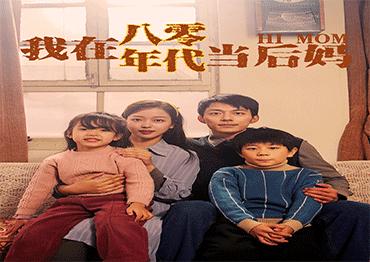Bite-sized micro-dramas have quickly become a multi-billion yuan industry, filling viewers’ fragmented downtime with feelgood stories that keep them paying for more

Huang Hanxuan, a micro-drama director, edits his recently wrapped shoot at his office in Hengdian World Studios, Dongyang, Zhejiang Province (Photo by VCG)
In China, a new kind of online show is enhancing mealtimes: “digital pickles” – short, engaging dramas that make eating more enjoyable by “adding flavor” to a boring meal break. Leading the trend are micro-dramas. With episodes lasting around a minute, they are captivating smartphone users with their bite-sized storytelling.
“I can’t imagine my lunch breaks without this key ingredient,” said Li Jingxiao, a 23-year-old bank employee from Qingdao, Shandong Province. Her favorite, I Became a Stepmother in the 80s, has been a sensation since its release in February 2024.
With each episode just one minute, the rom-com narrates how a modernday college student mysteriously travels back to the 1980s and takes over the body of a woman set to marry a divorced pig farmer with two children. The series follows as she navigates his family while dealing with the culture shock of 1980s China. Filmed in just 10 days on a small budget, the 82-episode series immediately gained a massive following, accumulating over 20 million yuan (US$2.8m) in user payments upon its debut. By May 30, related hashtags on short-video platform Douyin had amassed 1.15 billion views.
Since 2022, micro-dramas have become big business. Search phrases and hashtags like “Seven days to write a story,” and “24 hours to earn 10 million yuan (US$1.38m)” highlight the overnight success and high profitability of these shows, also known as ultrashorts.
The market is rapidly approaching that of traditional film and TV.
Typically viewed on mini-apps in WeChat or social media platforms, ultrashorts consist of 80 to 100 episodes shot in vertical format, catering to smartphone users looking for quick fixes of entertainment suited for busy schedules.
Instead of avoiding well-worn tropes like rags-to-riches, spousal revenge and Cinderella stories, these shows lean into cliché, tapping into the universal love for melodrama and escapism.

Poster for micro-drama I Became a Stepmother in the 80s (aka Hi Mom)
‘Empty My Brain’
Covering over 30 square kilometers, Hengdian World Studios in Dongyang, Zhejiang Province is one of the world’s largest film complexes. It is also a hub for China’s ultrashorts industry.
The studio has seen a surge in vertical-format ultrashorts shoots, outnumbering those for traditional films and TV shows. At its peak last year, more than 60 new micro-drama projects began shooting in a single week.
Actor Li Heyan recently started filming his fourth 80-episode series in a month at Hengdian. Born in a small town in northeastern China, Li worked as a primary school PE teacher, golf coach and small restaurant owner. In 2020, after closing his struggling restaurant, he found work as an extra in Hengdian productions, earning 2,000 to 3,000 yuan (US$276 to 414) a month.
Li’s fortunes changed in August with the micro-drama boom. “I found my break as the industry grew,” Li told NewsChina. Now, he works almost non-stop, filming every day and sometimes sleeping only two to three hours. Despite the tough schedule, he earns over 20,000 yuan (US$2,760) a month, significantly more than before.
Li is one of over 100,000 actors engaged in micro-drama productions, according to Chen Ye, head of microdrama projects at Beijing-based Huaxia Wenguang Media Group.
According to a report by industry consultancy iiMedia Research, the market size of micro-dramas in China reached 37.39 billion yuan (US$5.1b), a yearon-year increase of 268 percent. In 2023 alone, 3,574 micro-dramas were made, 1,125 of which were released.
The report predicts the market will reach 50 billion (US$6.9b) in 2024 – approaching the 2023 total box office intake for Chinese film at 54.9 billion yuan (US$7.5b). By 2027, the market size is expected to hit 100 billion yuan (US$13.8b).
Cai Qing, a 27-year-old nurse from Yueyang, Hunan Province, initially disliked “cheesy and low-quality” microdramas, but they gradually became her way to unwind after a long shift. She finds comfort in their short, predictable plots. “When I get home, I just want to lie on the sofa and empty my brain,” Cai said.
A long-time fan of web novels, Cai prefers the quick and engaging format of ultrashorts over the eventual bloat that online novels take on. “The thing is, lots of writers update a new 3,000- word chapter daily to keep readers paying. But by the end, the novel is usually loose, lengthy and boring,” she said.
But with their rapid plot twists, fastpaced storytelling and well-placed cliffhangers, “digital pickles” keep viewers coming back for more. “Most microdramas are indeed cheesy and cliché, but it seems that the cornier they are, the more addictive they get,” Cai said.
“So addictive,” echoed Wang Shuang, a 47-year-old accountant from Xuchang, Henan Province, who finds herself unable to stop watching despite the predictable plots and sometimes poor acting. “Every time I finish one, I feel a sense of loss and wistfulness,” Wang said.
By December 2023, China’s online viewership reached 1.074 billion, according to the China Netcasting Services Association. The report indicated that more than half of these users had watched ultrashort dramas in the past six months, with 39.9 percent being frequent viewers and 31.9 percent paying for content.
Micro-dramas often use a per-episode payment model: the first few episodes are free, and subsequent ones cost 1-2 yuan (US$0.14-0.28) each. Their frequent cliffhangers entice viewers to continue paying. An entire series may cost around 100 yuan (US$14).
Wang said she had spent over 300 yuan (US$42) on micro-dramas in less than a month, about the price of six or seven movie tickets. “They have a grip on my wallet and sleep schedule,” Wang said.
‘Feeling Good is King’
Micro-dramas can be broadly categorized into two types: male- or femaleoriented. Heavily influenced by online web novels, their stories are designed with crucial moments of catharsis that cater to viewers’ fantasies.
Romance dominates the female centric dramas, and Cinderella stories are the most common. Known in the industry as the “domineering CEO” trope, plots depict the romance between a wealthy, powerful young man – typically a business elite – and a young woman from a humble background. Revenge is another prevalent theme, with wives often seeking retribution against a cheating husband, mistress or vindictive mother-in-law.
In male-centric works, “secret identity” narratives are a favorite. These stories feature protagonists that outwardly appear poor and weak, often bullied by people of higher economic class. In reality, they are powerful alpha males like industry moguls, royals or gods in fantasy stories. The highlight of these dramas is the moment of revelation, delivering a satisfying dose of comeuppance.
In a typical minute-long episode, a conflict might occur in the first 15 seconds, a new incident might unfold in the next 30, and a cliffhanger is guaranteed in the last 10. “Everything in microdramas is fast-paced, since gratification is what it’s all about,” said Li Zheng, a media analyst.
“In micro-dramas, feeling good is king,” echoed Chen Nian, an editor and supervisor for many ultrashorts. “If a screenwriter writes ‘Mr. CEO spent 500,000 yuan (US$69,193) buying out the entire venue for the night,’ I would recommend changing it to 500 million yuan (US$69m),” Chen said. “Money in micro-dramas isn’t real – it’s just a prop to satisfy people’s wildest fantasies.”
Chen highlighted the importance of character portrayals that border on cartoonish. “In hit micro-dramas, main characters are either extremely bad, snobby or stupid. Exaggerated extremes make the shows more appealing.”
Li Wei, a professor of economics at the Cheung Kong Graduate School of Business in Beijing, discussed the consumer psychology behind the success of ultrashorts in his article for economics news outlet Yicai titled “Micro-drama Boom, Lower-tier Market and Spiritual Consumption.” Li references the “lipstick effect,” which describes consumers’ tendencies to spend on small luxuries during economic downturns.
“People lead hard lives. They have little time for entertainment and relaxation. Micro-dramas fill their fragmented leisure time with instant gratification. So why not?” Li wrote.

Promo poster for micro-drama Go Queen Go
‘Quality is King’
Despite the increasing influx of investors eager for profits, the ultrashorts industry faces mounting pressure from skyrocketing costs and tighter government controls.
Song Ding, a lighting director primarily working at Hengdian, has witnessed significant budget changes.
“Back in 2022, the genre wasn’t as popular. Producing a modern-themed ultrashort series usually cost about 100,000-150,000 yuan (US$13,800- 20,700). Costs have surged since May 2023, when producing a show might cost 200,000 yuan (US$27,619). By last October, the price had risen to 300,000- 400,000 yuan (US$41,400-55,250). But investors of all kinds still want a piece of the action,” Song told NewsChina.
Unlike traditional films and TV series, promotion costs of micro-dramas can be tenfold what they took to make. But promotion is crucial to their success.
Yang Tian, a micro-drama producer from a leading production firm, told NewsChina, “It takes about 300,000 yuan to produce an ultrashort drama, but promoting the show usually takes 3 million (US$414,300) or sometimes even 10 million (US$1.3m),” he said.
“Costs have risen in every aspect,” Yang added. “[When portraying a rich person] in the past, a Mercedes-Benz would do. But now, you need to rent either a Lamborghini or a Ferrari. Before, it was totally fine to shoot in an apartment, but now you need a three-story luxury home.”
Such portrayals, themes and content have prompted authorities to strengthen censorship.
On November 15, 2023, the National Radio and Television Administration (NRTA) launched a month-long campaign targeting micro-dramas, implementing seven key measures to regulate the sector.
From November 2022 to November 2023, more than 31,700 shows totaling over 1.7 million episodes were taken offline for explicit content, violence, vulgar aesthetics and “poor taste.” In addition, 5,408 ultrashorts containing violations were removed from the internet.
The popular show Go Queen Go was among them. The 120-episode period micro-drama went viral upon release on November 16, 2023, pulling in 20 million yuan (US$2.76m) in viewer payments within 24 hours. The show’s heroine, Song Zhao, sought revenge for her wronged mother by poisoning her father, murdering her grandmother and burning her half-sister to death.
The show was entirely removed on November 21, 2023, just five days after its release, criticized for promoting radical violence and vengeance.
Kang Ying, a micro-drama producer, told NewsChina that tighter control from authorities has put an end to the previous wild growth of the industry. “It has initiated a new round of shuffling for industry players. Creators will gradually return to the fundamental principle of TV production: ‘quality is king.’”

 Old Version
Old Version


